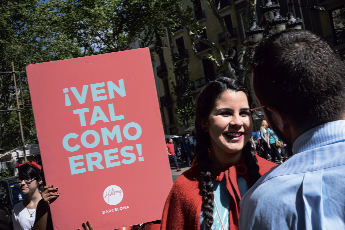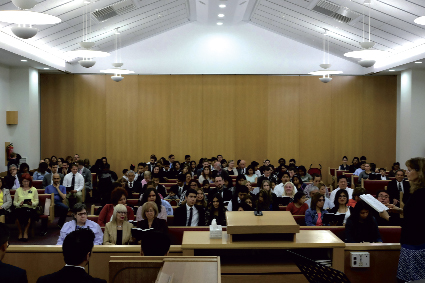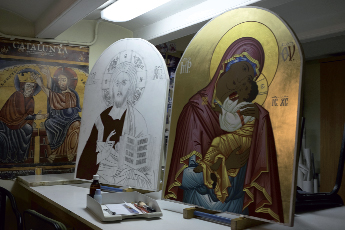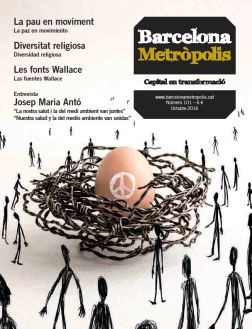The legal treatment given to religious diversity in Spain and, therefore, in the city of Barcelona, is unequal. The secularism of the State, although it is laid down in the Constitution, is entelechy for many communities that endure precarious conditions and can barely conduct their worship in a dignified manner.

Volunteers from the Evangelical Hillsong Church inform passers-by on La Rambla about their community, prior to Sunday services at their centre in the historic Teatre Principal.
Photo: Arianna Giménez
Albert Riba, Chair of Ateus de Catalunya (Atheists of Catalonia), recalls the figure of Gaietà Ripoll, after whom the magazine published by the association is named. A soldier, scholar, teacher and pantheist, Ripoll was condemned to the gallows in 1823 by a Spanish Inquisition faith tribunal for failing to teach the Catholic doctrine in his classes. As a gesture of humanity, instead of burning him at the stake, which was the usual punishment, he was hanged over a piece of wood on which the executioners had painted some flames. He was the last person to be executed by the Spanish Inquisition.
The first non-Catholic communities came to Barcelona after heresy had been decriminalised: the Protestants (or Evangelicals), who arrived in the mid-19th century; the Adventists, who reached Barcelona in 1903, in the form of three Californian missionaries; and lastly the Jews, who, in 1918, opened their first synagogue in the city for four centuries.
Franco’s dictatorship slowed the expansion of religions other than Catholicism. But the defeat of the Nazis and pacts with the US and the Vatican forced the fascist regime to tone down prohibitions on the grounds of belief and to establish basic religious freedoms in order to gain access to international recognition. Worship in private was restored, but “in chapels that could not bear any external sign that would enable them to be identified, and not without sporadic episodes of violence and attacks on the locals”, recalls Joan Estruch, sociologist and founder of Investigacions en Sociologia de la Religió (ISOR, Research in Sociology of Religion), in his book Las otras religiones: Minorías religiosas en Cataluña (The Other Religions: Religious Minorities in Catalonia) (ed. Icaria, 2007).[1]
Since the 1960s, religious diversity has been thriving in Barcelona. The first Baha’i centre was opened in 1965. Emilio Egea, member of the only Baha’i community in the city, explains that when his parents converted to the Baha’i faith, the police checked on them and censored their correspondence because their home was the meeting place for the community. “We often only received permission from the police just minutes before the meeting, making it impossible to meet”, recalls Egea. The Baha’i faith bases its precepts on the existence of just one religion and one god, and it advocates equality in terms of gender, class and opportunity for all humankind.
Jehovah’s Witnesses, present in the city since the 1940s, suffered during the Franco dictatorship owing to their refusal to swear loyalty to the flag and to take up arms, which made them the first conscientious objectors in Spain. Josep Morell, a member of the Jehovah’s Witnesses in Catalonia, served a two-year prison sentence in Melilla: “It was nothing compared to the time served by other Witnesses”. He was released two weeks after Franco’s death. Today, there are 16 Kingdom Halls (the name of their places of worship) in Barcelona, where they read the Bible before going out to the streets to explain it to people.

A religious service in the Mormon community (also known as The Church of Jesus Christ of Latter-day Saints) in their new chapel on Carrer de Cantàbria, a premises that was once the Verneda cinema.
Photo: Arianna Giménez
Proselytism is also a basic element of The Church of Jesus Christ of Latter-day Saints, better known as the Mormons because of the vital importance the Book of Mormon has to its adherents. Young people between the ages of 18 and 26 work as missionaries for two years to spread the message abroad. Regularised since 1968, thanks to the dictatorship’s first religious freedom law, the Mormons have two places of worship in Barcelona.
In the early 1970s, the Protection of the Mother of God Orthodox Church was set up in the Esquerra de l’Eixample. The parish was formed by four Catalan converts, although the fall of the Berlin Wall and the war in Yugoslavia led to people from Eastern Europe joining the community. For that reason, prayers and liturgies are sometimes conducted in Russian or Romanian, although Catalan is normally used (in addition to Latin). There are currently six orthodox communities in Barcelona.
Economic and legal inequality
It is set forth in Article II of the updated Concordat with the Holy See – signed just five calendar days after the Spanish Constitution was approved in 1978 – that the State undertakes to financially support the Church. In Article V, the Catholic Church “declares its intent to achieve by itself sufficient resources to meet its needs”. That has still not happened. The April 2015 report from the association Europa Laica (Lay Europe) estimated that the State has given €11 billion to the Catholic Church in the form of direct subsidies and tax exemptions. That amounts to 1% of Spain’s GDP.

A workshop on the iconography of the Orthodox Parish The Protection of Our Most Holy Lady, the Mother of God, in the Eixample district.
Photo: Arianna Giménez
The introduction of Eastern faiths (Buddhism, Hinduism and Taoism) to Barcelona in the 1970s and 1980s stemmed largely from the hippie movement and from the journeys some Catalans had made in previous years to India; in some cases, they even returned with a guru. There are now 25 Buddhist centres (either Zen or Tibetan) and five Hindu centres in Barcelona.
Article 7 of the 1980 religious freedom law allows the State to enter into agreements with religions that can demonstrate “clear roots” in the country. Since the law entered into force, Muslims, Protestants, Jews, Mormons, Jehovah’s Witnesses, Buddhists and Orthodox Christians have achieved this status, but only the first three – Muslims, Protestants and Jews – have signed cooperation agreements with the State. These agreements go back to 1992 and grant a series of privileges, such as the option to own separate plots in cemeteries, exemptions from property tax for places of worship owned by these communities and, in particular, access to public funding.
The law provides that this aid must be exclusively channelled through the Fundación Pluralismo y Convivencia (Pluralism and Coexistence Foundation), created to this end by the Ministry of Justice. In 2016, the State distributed more than €780,000 among the Evangelical, Jewish and Muslim federations to carry out programmes, organise the federations and improve the facilities of the entities they comprise. But if the entity does not belong to any of the federations registered with the Fundación Pluralismo y Convivencia, it does not get a penny.
Mohammed Iqbal, Vice-Chair of the Minhaj-ul-Quran Muslim association, believes that the 1992 agreements are little more than a dead letter: “The saying goes that things are easier said than done, right? Well, no matter what anyone might say, the State doesn’t provide resources.” Jai Anguita, Chair of the Jewish community Bet Shalom, goes even further: “The model for the agreements was dire. It is anti-constitutional.” For Mar Griera, director of ISOR, they are no more than symbolic agreements: “They were signed to pave the way for international relations and with a desire for historic reconciliation due to the role Spain played in expelling religious minorities.”
The legal treatment given to religious diversity in Spain and, therefore, in the city of Barcelona, is unequal. The secularism of the State, although it is laid down in the Constitution, is entelechy for many communities that endure precarious conditions and can barely conduct their worship in a dignified manner. If we look to Rome, the words of Pope Francis are illuminating: “States must be secular. Confessional states end badly. That goes against the grain of history”, he said in an interview with French Catholic magazine La Croix in May 2016.



